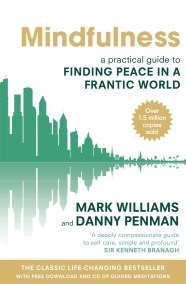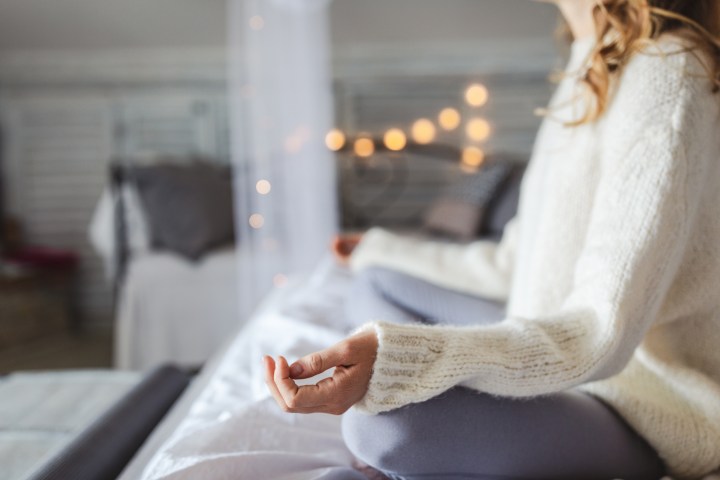Focusing on Your Mental Wellbeing

We are often open about our physical health – whether it’s feeling under the weather, a terrible bout of flu or a crippling migraine – but how often do we seriously consider our mental health? Many of us lead busy, often hectic, lives, so it’s easy to feel overwhelmed and drained by the end of the day. Mindfulness experts Mark Williams and Danny Penman explain how meditation can help to put your mind at ease.
Can you remember the last time you lay in bed wrestling with your thoughts? You desperately wanted your mind to become calm, to just be quiet, so that you could get some sleep. But whatever you tried seemed to fail. Every time you forced yourself not to think, your thoughts exploded into life with renewed strength. You told yourself not to worry, but suddenly discovered countless new things to worry about. You tried fluffing up the pillow and rolling over to get more comfortable, but soon enough, you began thinking again. As the night ground ever onwards, your strength progressively drained away, leaving you feeling fragile and broken. By the time the alarm went off, you were exhausted, bad tempered and thoroughly miserable.
Throughout the next day you had the opposite problem – you wanted to be wide awake, but could hardly stop yawning. You stumbled into work, but weren’t really present. You couldn’t concentrate. Your eyes were red and puffy. Your whole body ached and your mind felt empty. You’d stare at the pile of papers on your desk for ages, hoping something, anything, would turn up so that you could gather enough momentum to do a day’s work. In meetings, you could barely keep your eyes open, let alone contribute anything intelligent. It seemed as though your life had begun to slip through your fingers . . . you felt ever-more anxious, stressed and exhausted.
So how can you find peace and contentment in such troubled and frantic times as these? Or rather, how can you rediscover them; for there is a deep wellspring of peace and contentment living inside us all, no matter how trapped and distraught we might feel. They’re just waiting to be liberated from the cage that our frantic and relentless way of life has crafted for them.
We know this to be true because we – and our colleagues – have been studying anxiety, stress and depression for over thirty years at Oxford University and other institutions around the world. This work has discovered the secret to happiness and how you can successfully tackle anxiety, stress, exhaustion and even full-blown depression. It’s the kind of happiness and peace that get into your bones and promotes a deep-seated authentic love of life, seeping into everything you do and helping you to cope more skilfully with the worst that life throws at you.
It’s a secret that was well understood in the ancient world and is kept alive in some cultures even today. But many of us in the Western world have largely forgotten how to live a good and joyful existence. And it’s often even worse than this. We try so hard to be happy that we end up missing the most important parts of our lives and destroying the very peace that we were seeking.
We’re not promising eternal bliss; everyone experiences periods of pain and suffering and it’s naive and dangerous to pretend otherwise. And yet, it is possible to taste an alternative to the relentless struggle that pervades much of our daily lives.
Below you’ll find a taste of a simple meditation practice that you can incorporate into your daily life. It is based on mindfulness-based cognitive therapy (MBCT) which grew out of the inspiring work of Jon Kabat-Zinn at the UMass Medical Center in America.
The MBCT technique revolves around a form of meditation that was little known in the West until recently. Mindfulness meditation is so beautifully simple that it can be used by the rest of us to reveal our innate joie de vivre. Not only is this worthwhile in itself, but it can also prevent normal feelings of anxiety, stress and sadness from spiralling downwards into prolonged periods of unhappiness and exhaustion – or even serious clinical depression.
A typical meditation consists of focusing your full attention on your breath as it flows in and out of your body (see One-minute meditation box below). Focusing on each breath in this way allows you to observe your thoughts as they arise in your mind and, little by little, to let go of struggling with them. You come to realise that thoughts come and go of their own accord; that you are not your thoughts.
A one-minute meditation
- Sit erect in a straight-backed chair. If possible, bring your back a little way from the rear of the chair so that your spine is self-supporting. Your feet can be flat on the floor. Close your eyes or lower your gaze.
- Focus your attention on your breath as it flows in and out of your body. Stay in touch with the different sensations of each in-breath and each out-breath. Observe the breath without looking for anything special to happen. There is no need to alter your breathing in any way.
- After a while your mind may wander. When you notice this, gently bring your attention back to your breath, without giving yourself a hard time – the act of realising that your mind has wandered and bringing your attention back without criticising yourself is central to the practice of mindfulness meditation.
- Your mind may eventually become calm like a still pond – or it may not. Even if you get a sense of absolute stillness, it may only be fleeting. If you feel angry or exasperated, notice that this may be fleeting too. Whatever happens, just allow it to be as it is.
- After a minute, let your eyes open and take in the room again.
Over time, mindfulness brings about long-term changes in mood and levels of happiness and wellbeing. Scientific studies have shown that mindfulness not only prevents depression, but that it also positively affects the brain patterns underlying day-to-day anxiety, stress, depression and irritability so that when they arise, they dissolve away again more easily.
THE LIFE-CHANGING BESTSELLER - OVER 1.5 MILLION COPIES SOLD
'A deeply compassionate guide to self-care - simple and profound' Sir Kenneth Branagh
'If you want to free yourself from anxiety and stress, and feel truly at ease with yourself, then read this book' Ruby Wax
Authoritative, beautifully written and much-loved by its readers, Mindfulness: A practical guide to finding peace in a frantic world has become a word-of-mouth bestseller and global phenomenon. It reveals a set of simple yet powerful practices that you can incorporate into daily life to break the cycle of anxiety, stress unhappiness and exhaustion. It promotes the kind of happiness that gets into your bones and allows you to meet the worst that life throws at you with new courage.
Mindfulness is based on mindfulness-based cognitive therapy (MBCT). Co-developed by Professor Mark Williams of Oxford University, MBCT is recommended by the UK's National Institute for Health and Care Excellence and is as effective as drugs for preventing depression. But, equally, it works for the rest of us who aren't depressed but who are struggling to keep up with the relentless demands of the modern world.
By investing just a few minutes each day, this classic guide to mindfulness will put you back in control of your life once again.









